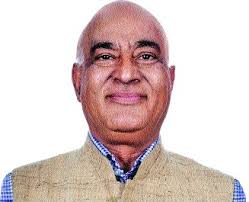Synchronised elections, voter behaviour, and governance outcomes
An active policy proposal of the Government of India is to hold national elections at the same time as the assembly elections of all the states. This article examines whether holding national and stat...
-
 Vimal Balasubramaniam
Vimal Balasubramaniam  Sabyasachi Das
Sabyasachi Das  Apurav Yash Bhatiya
Apurav Yash Bhatiya  28 August, 2020
28 August, 2020
- Articles
Political determinants of newspaper markets in India
Newspapers are an important source of political information for Indian voters. This article looks at how political factors influence the newspaper market. Using the announcement of delimitation in the...
-
 Julia Cagé
Julia Cagé  Guilhem Cassan
Guilhem Cassan  Francesca R. Jensenius
Francesca R. Jensenius  23 November, 2023
23 November, 2023
- Articles
A proposal for public funding of elections and political parties in India
The Finance Minister of India recently introduced measures aimed at cleaning up political party funding in the country. In this article, Gowda and Santhosh highlight the limitations of these measures,...
-
 M.V. Rajeev Gowda
M.V. Rajeev Gowda  Varun Santhosh
Varun Santhosh  21 April, 2017
21 April, 2017
- Perspectives
(Un)ease of doing business: How congested courts hinder firm productivity
The strength of contract enforcement determines how firms source inputs and organise production, and hence influences productivity. Using microdata on Indian manufacturing, this article quantifies the...
-
 Johannes Boehm
Johannes Boehm  Ezra Oberfield
Ezra Oberfield  01 March, 2019
01 March, 2019
- Articles
Out of power? Political capture of the Indian electricity sector
Although power generation has been growing exponentially in India, the quality of electricity supply remains poor. This article argues that political corruption is among the root causes behind unrelia...
-
 Meera Mahadevan
Meera Mahadevan  21 January, 2019
21 January, 2019
- Articles
Need for a choice-based approach in PDS
A large share of public spending on the Public Distribution System (PDS), India’s flagship food security programme, does not reach intended beneficiaries. Thus, the idea of Direct Benefits Transfer ...
-
 Karthik Muralidharan
Karthik Muralidharan  Paul Niehaus
Paul Niehaus  Sandip Sukhtankar
Sandip Sukhtankar  11 January, 2019
11 January, 2019
- Perspectives
Evaluating Economic and Administrative Linkages in Determining Firm’s Location Choice in Hajipur (Bihar)
The purpose of this project is to understand the rationales of firms’ location choice in which complex decision making mechanisms are manifested by various factors. This project attempts to understa...
-
 Abhinav Alakshendra
Abhinav Alakshendra  31 December, 2018
31 December, 2018
- IGC Research on India
Like father, like son? The economic impacts of political dynasties in India
Political dynasties remain ubiquitous in democratic countries even though many societies democratised to end hereditary rule. This article studies how dynastic politics affects economic development in...
-
 Siddharth George
Siddharth George  19 December, 2018
19 December, 2018
- Articles
Indian economy: High performer or Potemkin village?
The recent schizophrenic commentary on the health of the Indian economy raises questions on the true state: Is India doing really well or are we just seeing an impressive facade? In this post, Amartya...
-
 Amartya Lahiri
Amartya Lahiri  14 December, 2018
14 December, 2018
- Perspectives
Are independent candidates unimportant for political representation?
Independent candidates are often deemed ‘frivolous’ or ‘spoilers’ by mainstream political figures and authorities, although there is little to no evidence on their effect on elections. This ar...
-
 Sacha Kapoor
Sacha Kapoor  Arvind Magesan
Arvind Magesan  03 December, 2018
03 December, 2018
- Articles
Bank and its critics
There has been a lot of commentary in recent weeks on the Reserve Bank of India, around its capital base, performance, and autonomy. In this post, Amartya Lahiri contends that RBI has a more coherent ...
-
 Amartya Lahiri
Amartya Lahiri  16 November, 2018
16 November, 2018
- Perspectives
Promoting women in grassroots governance: Strategies that work
There are more than a million women elected to the Panchayati Raj Institutions of local governance in India. Despite constitutional provisions, women face many barriers when they participate in local ...
-
 Madhu Joshi
Madhu Joshi  14 November, 2018
14 November, 2018
- Notes from the Field
Does choice of procurement contract matter for cost and quality of highways?
In the past, infrastructure projects in India have suffered from long delays, massive cost overruns, and poor quality of assets. A widely held belief is that public private partnerships (PPPs) can sol...
-
 Ram Singh
Ram Singh  05 November, 2018
05 November, 2018
- Articles
Food subsidy – PDS, cash, or both?
Should food subsidies – currently availed in the form of subsidised cereals – be given out in the form of cash instead? In this post, Krishna and Agrawal contend that rather than asking this binar...
-
 Tushar Agrawal
Tushar Agrawal  Anirudh Krishna
Anirudh Krishna  31 October, 2018
31 October, 2018
- Perspectives
Anganwadi: A workforce of women with a near-impossible mandate
With a workforce of 1.4 million women, the Anganwadi system forms the backbone of India’s Integrated Child Development Services Scheme – the world’s largest community-based programme for child d...
-
 G. Ananthapadmanabhan Guruswamy
G. Ananthapadmanabhan Guruswamy  Kavitha Kuruganti
Kavitha Kuruganti  26 October, 2018
26 October, 2018
- Notes from the Field
Twitter feed
Tweets by Ideas4IndiaMost Popular Governance Posts
Unique Health Identification and Aadhaar: A case for mandatory linkage
As part of the Digital India initiative, All India Institute of Medical Sciences (AIIMS) issues a Unique Health Identification (UHID) number to each patient, which documents their entire journey in th...
 Mudit Kapoor
Mudit Kapoor  23 December, 2016
23 December, 2016
- Perspectives
Caste dominance in rural India: Cause and effect
Rural India remains a caste-based society. This column explores why caste continues to play such an important role and what the effects are. It argues that trade and agricultural productivity suffer, ...
 Siwan Anderson
Siwan Anderson  16 August, 2012
16 August, 2012
- Articles
Why did the Indian economy stagnate under the colonial rule?
How did the Indian economy fare under the colonial rule? Is the average Indian significantly better off after Independence? This column examines trends in GDP per capita in order to determine the stan...
 Aniruddha Bagchi
Aniruddha Bagchi  16 September, 2013
16 September, 2013
- Articles





 16 November, 2023
16 November, 2023






